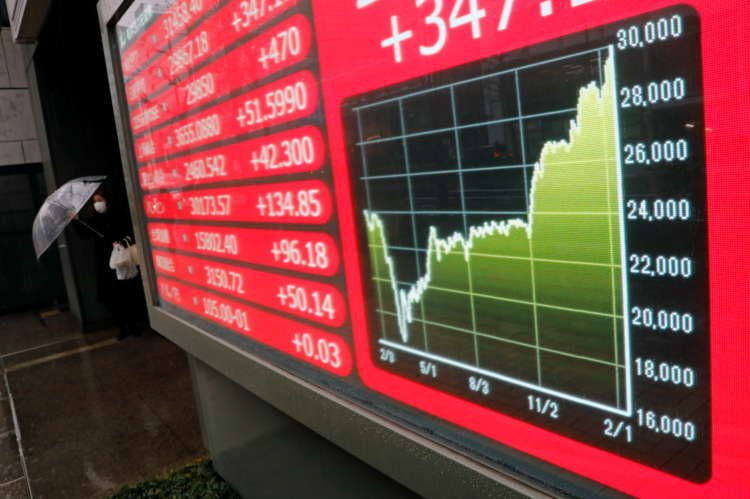Nikkei back above 30,000 after more than three decades
Published by linker 5
Posted on February 15, 2021
2 min readLast updated: January 21, 2026

Published by linker 5
Posted on February 15, 2021
2 min readLast updated: January 21, 2026

By Hideyuki Sano
TOKYO (Reuters) – Japan’s Nikkei share average rose above the 30,000 level for the first time in more than 30 years on Monday, as it regained the ground lost during decades of economic stagnation.
Japanese stocks have capitalised on an anticipated global rebound from the COVID-19 pandemic this year, with the abundance of cyclical shares, such as electronic parts makers, attracting global investors.
The break of 30,000 could open the way for test of all-time high of 38,957, touched at the end of 1989.
The Nikkei’s epic downfall since then even dwarfed the Wall Street’s worst bear market after the Great Depression. The Dow Jones Industrial Average took 25 years to recover to its previous peak.
None of the Japanese banks that topped the list of companies with biggest market capitalisation in 1990 exist now, as they subsequently suffered massive loan losses and repeated mergers to survive.
Tokyo Electric Power Co, the biggest firm outside banks back then, became irrelevant for investment in 2011 after the Fukushima nuclear plant disaster.
Today, the market is led by Toyota Motor, one of the country’s last bastion of exporters, followed by Masayoshi Son’s SoftBank Group, which was not listed three decades ago, and tech companies.
Foreign ownership of Japanese shares has grown to almost 30% from 4% in 1990, as domestic banks and companies have unwound cross shareholdings.
The last time the Nikkei traded above 30,000 was Aug. 3, 1990, a day after Iraq’s surprise invasion of Kuwait poured cold water on investors expecting the peace will prevail after the end of Cold War in late 1989.
Compared to the 1988-1990 period, most investors see the Nikkei’s rise above 30,000 as less frothy. The market is traded at about 17 times expected earnings, higher than recent years but not about 50 times in 1990.
Still, some players see a similarity.
“Somehow, there is a similar feel now. At the time we had a crazy bubble and the Bank of Japan did a monetary easing in a scale that had been previously unthinkable,” said Hiroaki Hayashi, managing director at Fukoku Capital Management.
“Then we had the collapse of the Soviet Union and the world entered a new era. Now, we have the bitcoin and GAFA shares soaring while fiscal policies around seem unsustainable. The world order is looking shaky too, as evident in the changing U.S.-China relations.”
(Editing by Subhranshu Sahu)
Explore more articles in the Trading category











